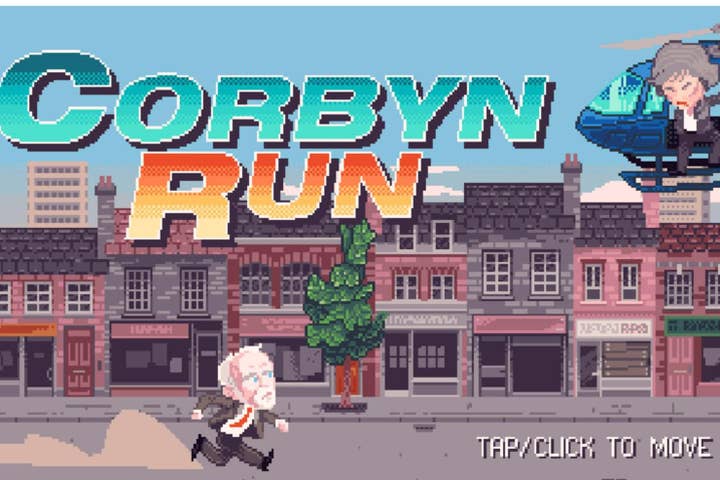Games for the Many: how Labour plans to win elections with video games
Designer Rosa Carbó-Mascarell on using video games to make politics accessible
There is an inherent problem with politics in the UK, in that it's painfully obtuse at times. The language we use, the frames of reference, the innumerable intricacies surrounding policy. Political discourse is often impenetrable, and it leaves those without a proper grounding completely adrift.
In that respect, politics bears an uncanny resemblance to video games. You either understand what's going on, or you don't. It's obviously a difficulty for both, but when the future of the entire country hangs in the balance this unapproachable quality is most problematic. Accessibility is the key to success; it's why Angry Birds is bigger than Bloodborne, and why the series finale of MASH got more views than votes were cast in the 2017 general election.

It is on this basic principle that Games for the Many was founded, and with which the surprise hit Corbyn Run burst onto the scene in May 2017. The free Android and iOS game gained the sort of traction of which political parties can only dream. It was downloaded over 150,000 times, which is obviously small fry in the world of mobile downloads, but huge when it comes to political engagement. On top of that it was featured almost everywhere, from the BBC and the Guardian, through to Buzzfeed and Kotaku.
As a point of comparison, political parties pour millions into literature and online ads during elections. Most leaflets are designed with one goal in mind: you have five seconds between the doormat and the bin to get someone's attention, and after that it may as well have never existed.
By all accounts Corbyn Run was a roaring success, so much so that Games for the Many now receives funding directly from the Labour Party.
"The Labour Party looks for new and innovative ways to spread our message of a country run for the many not the few. All spending is declared in line with electoral law," a party spokesperson told GamesIndustry.biz.
Along with a number of eager volunteers who have pledged what skills they have to the project, Games for the Many is headed up by recent game design MA graduate Rosa Carbó-Mascarell, and CrowdPac political analyst James Moulding.
"The whole goal of that was to transform Labour's manifesto into something accessible to the general public as most people wouldn't go online to read a massive manifesto," says Carbó-Mascarell.

But of course, Games for the Many is more than just Corbyn Run, and is more than just a development studio. It's about enabling developers to think about their games with a more political mindset, and teaching those in politics the value of games.
"Looking at how games can impact politics, that's quite a big question and I'm not sure anyone has all the answers, so we're trying to make this as grassroots as possible," says Carbó-Mascarell.
"So we're not just making games; we're running game jams and trying to teach lots of people how to make games, and how to express politics in games as a way of giving them a voice, and helping us understand the power of games in politics."
Developers, policy makers, and campaign groups such as Momentum have been invited to the inaugural game jam on December 2nd and 3rd at the Red Museum, London. Another is planned for next year in Manchester.
"The whole goal of that was to transform Labour's manifesto into something accessible to the general public as most people wouldn't go online to read a massive manifesto"
Carbó-Mascarell says that games are uniquely positioned to overcome the obstacle of making complex policy accessible, and that game jams will play an important role.
"Games in particular are good at teaching how systems work and being able to play around with quite complex ideas," she says. "So I think it will be quite valuable for everyone really to help get their head around politics."
Games for the Many made quite an impression with Corbyn Run, but it's the game jams and future projects that really brought Labour on board, and it's where the long term goals of the project lie.
Carbó-Mascarell says that the party is fully behind them and, in a meeting attended by Jeremy Corbyn himself, it signed off on all of their proposals.
But politics moves fast and game development does not. This presents a unique challenge to the team which has the prime directive of make political policy accessible.
"In that sense, it's quite challenging, but the good thing about the way games are made now, it's become quicker, which has allowed political games easier to make," says Carbó-Mascarell. "You don't have to spend an entire year working on a game about news that was topical at one moment but a year later, of course, is no longer relevant."
At present, Games for the Many has to build projects that demonstrate "a certain feeling" rather than a specific point.
"For example with Corbyn Run, the emotion that we designed around was building momentum," says Carbó-Mascarell. "You're playing Corbyn and as you launch manifesto pledges people join you. We're not really make a comment on the manifesto pledges themselves, you see them when you announce them, but the feeling of the mechanics is you're building a movement."
"I don't think badges or points are particularly useful because badges don't mean anything unless players actually feel engaged with it in some way"
Simple, effective, engaging; something which will be far more difficult to achieve with the team's forthcoming projects. Though she couldn't share many details, Games for the Many is developing something for the May 2018 council elections, which is particularly challenging as there isn't a single figure or issue to latch on to.
The team's main project, however, is looking at ways to use augmented reality to incentivise election canvassing for volunteers - something which shadow chancellor John McDonnell jokingly refers to as "The Pokémon Go for canvassing."
Gamifying systems have proved massively successful in a number of sectors, from education, to dieting. Simple incentives like badges or points can sometimes be more than enough to jumpstart the reward centres in our brains, but for Carbó-Mascarell that doesn't cut it.
"We're trying to pull away from gamifying it," she says. "I don't think badges or points are particularly useful because badges don't mean anything unless players actually feel engaged with it in someway, so I'm not sure that's the way to go with this sort of stuff. So we're thinking beyond the gamification pool, and think more about game design and what mechanics work in the context."
Despite being in the embryonic stages, Games for the Many could represent a previously unexplored avenue for the application of video games. Obviously games have been political in the past; titles like Papers Please, This War of Mine, or Bury Me, My Love don't shy away from difficult, and very real issues. But Games for the Many isn't trying to paint a nuanced picture of suffering, it's unpicking the complex, opaque web of politics and rearranging it in terms anyone can understand.
